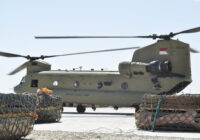Turkish President Recep Tayyip Erdogan caused waves at the NATO summit in June, announcing that Turkey would continue to protect Kabul airport following the complete NATO withdrawal from Afghanistan. Kabul airport is Afghanistan’s principal air connection to the outside world, and it is vital for the security of diplomats and aid workers in the country.
The proposal needs to be seen in the context of the broad militarization of Turkish foreign policy. In recent years, Ankara has deployed armed forces for geopolitical leverage in Syria, Somalia, Libya, the Eastern Mediterranean and Azerbaijan. The associated costs have remained very low, further emboldening Turkish policymakers. In Somalia and Syria, the Turkish military also gained experience operating in theaters where armed militants pose significant security challenges.
Joe Biden Meets Afghanistan’s Leaders as the Country Faces Collapse
The main factor behind the airport proposal, however, is Turkish-American relations. Ankara hopes to regain favor with Washington after a string of diplomatic crises. The Turkish side knows its hand is weakened by issues such as its acquisition of the Russian S400 air defense system and Washington’s responses, including CAATSA sanctions and removing Turkish manufacturers from the supply chain for the new F35 warplane. The Countering America’s Adversaries Through Sanctions Act, known as CAATSA, is a law passed by the US Congress in 2017 that intended to penalize Russia. In December 2020, Turkey was added to the sanctions list for its purchase of the S400. The proposal to help out in Afghanistan emerged as an obvious way to improve bilateral relations with the US.
A Good Reputation
As the only Muslim-majority member of NATO, Turkey played important roles in Afghanistan. Former Turkish Foreign Minister Hikmet Cetin served as NATO’s first senior civilian representative in Afghanistan and Turkish officers twice commanded the International Security Assistance Force (ISAF). There are currently 500 Turkish soldiers serving with the NATO mission. Turkey never deployed a combat force, however. The Taliban, in turn, avoided targeting Turkish forces; there has only been one attack on a Turkish unit.
Additionally, Turkish state institutions and NGOs conduct a broad range of cultural and educational activities and supply extensive humanitarian aid. Reports confirm the ability of Turkish officials and volunteers to engage with Afghan society on equal terms. Shared religious and cultural elements certainly help. Although the Taliban accuses of Ankara being too pro-Uzbek, Turkey is viewed very positively across Afghan society. This, together with its ability to talk with all sides and its non-combat role in ISAF, places Turkey in a unique position.
However, protecting Kabul airport would change the nature of Turkey’s involvement. While the Afghan government welcomed the idea, the Taliban have repeatedly declared that they will not tolerate even a residual foreign force. That implies that the Taliban would target Turkish troops, risking drastic consequences for Turkey. To avoid this, Turkey’s extended stay requires prior agreement with all Afghan parties, and Ankara will use its diplomatic capacity to seek such an agreement. Moreover, rather than focusing solely on leaving a residual force, Turkey could use its diplomatic and humanitarian leverage to pursue a more comprehensive approach to the Afghan problem.
Intra-Afghan Agreement Needed
The current peace agreement involves only the United States and the Taliban. There is as yet no peace agreement between the Afghan government and the Taliban. As the withdrawal of NATO forces accelerates, the conflict is now between the Taliban and Afghan government forces. Despite NATO’s decades of investment, the Afghan army is no match for the Taliban. In fact, a major Taliban offensive is already underway. Kabul may not fall immediately, but time is on the side of the insurgents. But if the Taliban overplays its hand and tries to dominate the entire country, there will be a backlash, particularly from the non-Pashtun ethnic communities.
In that case, Afghanistan is likely to descend back into civil war. Under such circumstances, a Turkish military presence would be too risky and unsustainable, even with agreements with the government and the Taliban. Rather than focusing only on protecting Kabul airport, Turkey should place its diplomatic weight behind a peaceful settlement between the Taliban and the government before violence spirals out of control. The first step toward a broader agreement between the Afghan parties themselves would be for Ankara to reach an agreement with each of them. This road is arguably a stony one, but it offers much greater rewards. Turkey would certainly need the support of other countries to overcome the obstacles involved.
The first challenge is to bring the Taliban to the negotiating table with the Afghan government, which Turkey and the international community have so far failed to achieve. Here, Turkey can benefit from its exceptionally good relations with Pakistan and Qatar. Qatar is home to the Taliban’s only external office and relations are cordial. Pakistan, where many senior Taliban leaders reside, has the greatest leverage. Even though large segments of Afghan society frown on Pakistan’s involvement in their country, its influence over the Taliban would be crucial for reaching a negotiated settlement.
Europe should be more active and support Turkey’s efforts diplomatically and economically. As well as that being the morally right thing to do, Europe has a tangible interest too. A resurgence of fighting in Afghanistan would trigger a wave of migration. Afghans are already the second-largest migrant community in Turkey after the 3.6 million Syrian refugees. They also formed the second-largest group of new asylum applications in Germany in 2020. Given Iran’s open-door policy, it would be realistic to expect waves of Afghan migration to Turkey and on to Europe. The specter of a new refugee crisis looms.
*[This article was originally published by the German Institute for International and Security Affairs (SWP), which advises the German government and Bundestag on all questions relating to foreign and security policy.]
The views expressed in this article are the author’s own and do not necessarily reflect Fair Observer’s editorial policy.
Support Fair Observer
We rely on your support for our independence, diversity and quality.
For more than 10 years, Fair Observer has been free, fair and independent. No billionaire owns us, no advertisers control us. We are a reader-supported nonprofit. Unlike many other publications, we keep our content free for readers regardless of where they live or whether they can afford to pay. We have no paywalls and no ads.
In the post-truth era of fake news, echo chambers and filter bubbles, we publish a plurality of perspectives from around the world. Anyone can publish with us, but everyone goes through a rigorous editorial process. So, you get fact-checked, well-reasoned content instead of noise.
We publish 2,500+ voices from 90+ countries. We also conduct education and training programs
on subjects ranging from digital media and journalism to writing and critical thinking. This
doesn’t come cheap. Servers, editors, trainers and web developers cost
money.
Please consider supporting us on a regular basis as a recurring donor or a
sustaining member.
Will you support FO’s journalism?
We rely on your support for our independence, diversity and quality.





